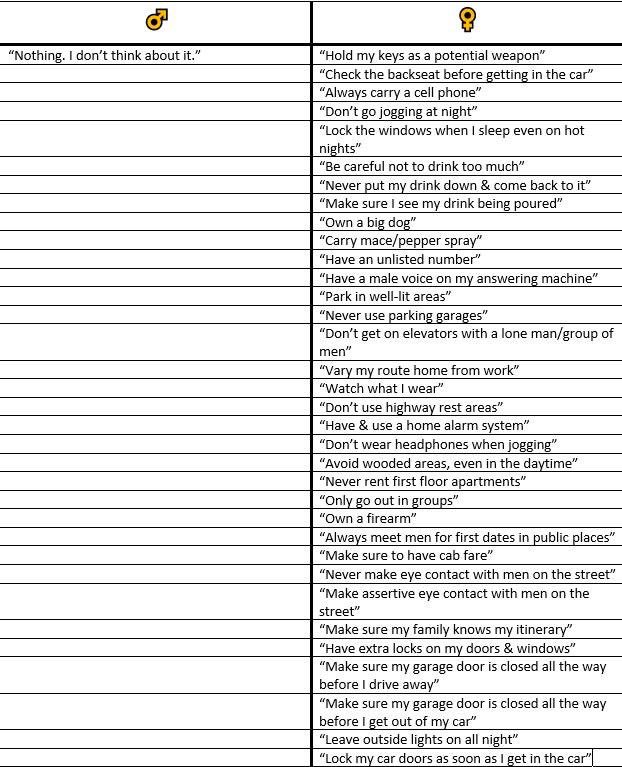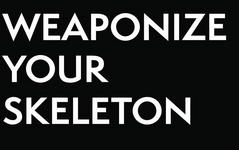Be the Problem
“What did you do today to prevent being sexually assaulted?”
Jackson Katz, a social researcher, asked the men in the room that question; they laughed. Then he asked the women.

Image credit: Jennifer Wright
The data is telling: Women live in a very different world than men, and, on balance, already know the preventative measures. They think about them every day, and constantly make decisions and alter their behavior to avoid putting themselves in vulnerable situations.
I’ve learned so much about this from the women in my life — those who train with us, female instructors, my wife. Seemingly minor details like how her car only unlocks the driver’s door when she thumbs the key fob — something I found annoying as a passenger, having to wait while she opened her door, got in, and then unlocked the rest of the car — annoying, that is, until she told me why. With that shift in perspective it not only made sense — it was necessary.
This is why when I was asked to put together a video series of “10 tips for women to keep themselves safe,” I demurred. Women already know how to keep themselves safe. What’s missing is what to do when all those measures fail, and the situation goes physical.
We live in a society where women are not truly encouraged or supported in going hands-on physical for debilitating injury — oh, we pay lip service to it, *wink-winking* the whole time while death row inmates laugh at the resulting training. And so women are given weak-sauce options (“women’s self-defense”) based on socially-acceptable sporting frameworks put together by men who have no understanding of the real issues (i.e., not in touch with their inner psychopaths, so the solutions tend to be more social than operational). Everyone should be suspicious of any physical training for women that a man would not also find useful.
What’s lacking is verifiable, gender-agnostic information on how to put hands on someone so they can’t continue. I can recount as many situations as you’d like where something as simple as knowing how to take an eye would have prevented a murder. (See also: true crime TV shows.) These stories affect me deeply, because many times the outcome was entirely avoidable with the smallest bit of actionable information. The last three people who used what we do were women who found themselves over the event horizon of the physical — the place where prevention and social interaction cease to make a difference — so they doled out broken legs, crushed groins, unconsciousness, and gouged eyes instead. This is why we do what we do.
The real difference for women is in the profiles they’ll face — primarily being grabbed in an attempt to overpower them. But the solutions to those issues are found in injury, not in gender-specific moves. We trained the women mentioned above the same way we train military and law enforcement, the same way we train men. The same way we train everyone with a brain, a skeleton, and mass. In the realm of physics and physiology, minor differences in plumbing don’t affect the outcome.
So instead of telling women what they already know — and practice daily — I thought about what I, as a male hand-to-hand combat instructor, could offer as advice. After double-checking with the women in my life — those who train with us, female instructors, my wife — we agreed on these stair-stepped concepts:
• Do all the preventative things you already know how to do — but when that fails you must ATTACK & INJURE. Escape will occur as a side effect to you hurting him so he can’t continue!
• Your survival is up to you — and you alone. You can’t rely on others to save you. But you can do this. Don’t have a problem — be the problem!
• It’s not strength-to-strength — it’s effort-to-vulnerability. (Eyes-throat-groin & knowing what’s required to crush them.) A finger in the eye can change everything!
If just one woman sticks her finger in an eye instead of struggling to get away or, worse, doing nothing because she doesn’t think there’s anything she can do, then all our efforts as a training community are worth it.
— Chris Ranck-Buhr


Leave a Reply
Want to join the discussion?Feel free to contribute!